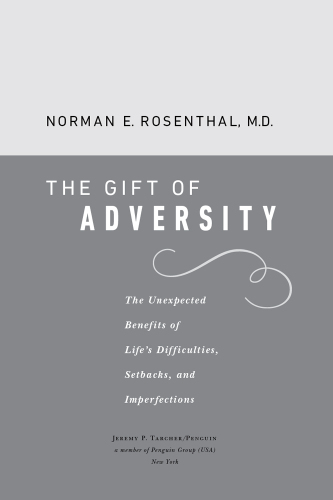
The Gift of Adversity
The Unexpected Benefits of Life's Difficulties, Setbacks, and Imperfections
کتاب های مرتبط
- اطلاعات
- نقد و بررسی
- دیدگاه کاربران
نقد و بررسی

June 24, 2013
Rosenthal made a name for himself in 1984 when he became the first psychiatrist to describe and diagnose “winter depression,” or Seasonal Affective Disorder. Since then, he’s written several books on that subject (e.g., Winter Blues) and on transcendental meditation (Transcendence). But readers expecting his newest to match the scientific rigor of his previous titles will be disappointed. This is by far Rosenthal’s lightest offering—essentially a memoir in vignettes, each capped with an inspirational (and often shopworn) aphorism (“Life is precious but precarious: treat it with the care and respect it deserves”). Luckily, Rosenthal’s story is an interesting one: from growing up Jewish in apartheid-era Johannesburg to struggling through med school, surviving a brutal stabbing, serving as a medical officer in the South African Army, getting caught up in a Ponzi scheme, and navigating the politics of Columbia University and the National Institute of Mental Health, his exploits are consistently engaging. However, chapters detailing the lives of others around him (like his family’s servants) feel out of place, and his efforts to wring a lesson from every anecdote become tiring. A more straightforward autobiography—sans the self-help and pop-science packaging—would’ve been more effective.

July 1, 2013
A psychiatrist takes instances from his own life to illustrate how "setbacks, reversals, and imperfections" can lead to unexpected insights. Rosenthal (Psychiatry/Georgetown Medical School; Transcendence: Healing and Transformation Through Transcendental Meditation, 2011, etc.) is best known for having defined "the syndrome of seasonal affective disorder," a winter depression caused by diminished daylight, and pioneering the use of artificial bright light to ameliorate its effect. While working at the National Institutes of Health, the author led a project that correlated its incidence with latitude and time of year, establishing that "SAD works via the eyes, not the skin." He and his wife had both been afflicted, and he describes the "sense of foreboding" he experienced when daylight savings time ended. Later in his career, he became an advocate of St. John's wort and Botox as treatments for depression. After 20 fruitful years at NIH, Rosenthal was the victim of a political shift there and was forced to resign. This led him to contemplate the pain of loss and the need to "reclaim a feeling of control" (which in his case meant becoming a writer) and to take up Transcendental Meditation. The author weaves together stories taken from his career and relates them to his earlier life growing up as a member of the South African Jewish community during the time of apartheid. He writes of a meeting with Austrian psychiatrist Viktor Frankl and his great admiration for Nelson Mandela. Rosenthal makes a convincing connection between lessons learned from his personal experiences and contemplation of the lives of heroic figures.
COPYRIGHT(2013) Kirkus Reviews, ALL RIGHTS RESERVED.

August 1, 2013
Best-selling author and psychiatrist Rosenthal begins this inspirational book with a quotation from Shakespeare's As You Like It: Sweet are the uses of adversity. It is his belief, expressed over and over again here, that one cannot navigate life successfully without experiencing and overcoming adversity. The trick, he insists, is to find something of value in the experience. In this way, he maintains, we can become stronger people if we learn from our mistakes and misfortunes. He divides adversity into three broad categories: the adversity that comes from bad luck; the adversity we bring about ourselves; and the adversity that we seek out, whether taking a calculated risk on something or setting off on an adventure. Rosenthal also offers methods and techniques to overcome adversity, including practicing meditation, developing healthy habits, and talking and writing about traumatic experiences, from the Holocaust to lesser evils (scams, grudges, the loss of dreams). Each chapter concludes with a reflection: Life is precious but precarious: treat it with the care and respect it deserves. Plenty of food for thought.(Reprinted with permission of Booklist, copyright 2013, American Library Association.)

























دیدگاه کاربران